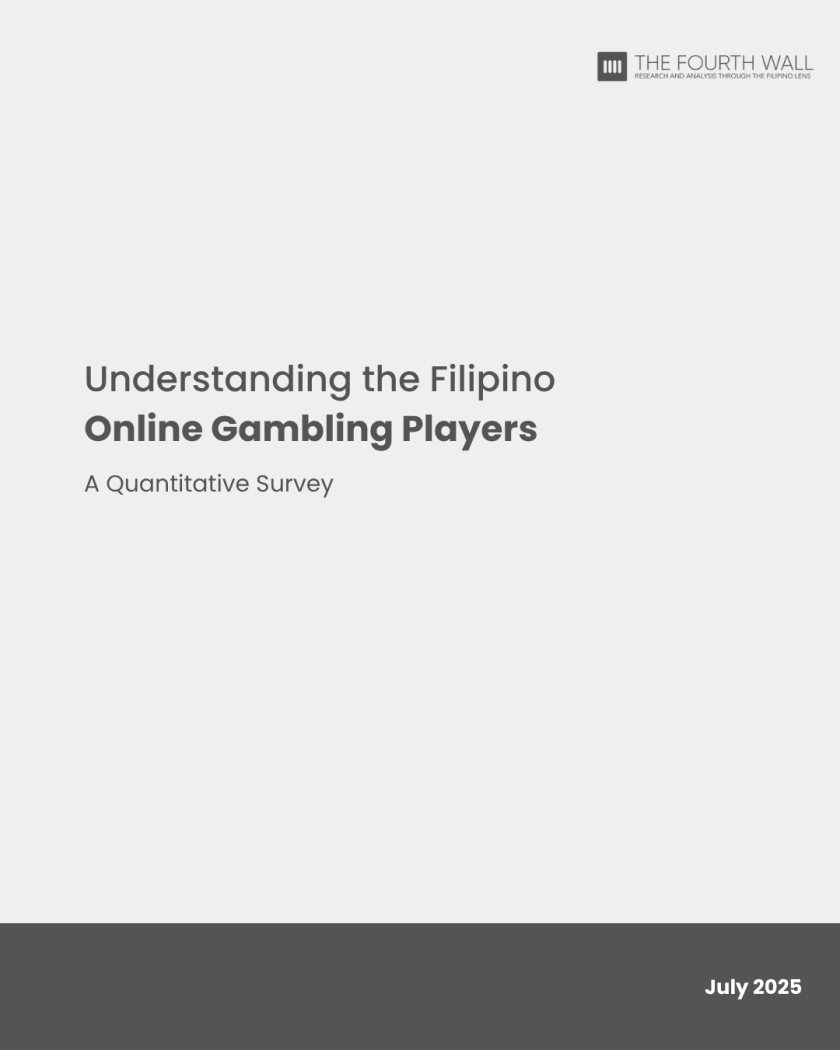
As online gambling continues to grow in the Philippines and remains at the center of national conversations, a recent study suggests that better regulations—not an outright ban—are needed to create a safer playing environment and prevent the proliferation of unregulated gambling platforms.
This is the key finding from the latest study by Filipino-focused sociocultural research firm The Fourth Wall, which analyzed the behaviors, motivations, and perceptions of Filipino online gamblers, particularly those using regulated platforms.
The study surveyed over 1,000 current online gambling players from urbanized areas across Mega Manila, Metro Cebu, Metro Davao, and key cities in other growth centers nationwide. Among those surveyed, the majority migrated from informal or unregulated street gambling environments, such as sabong, perya, or social media betting, and only 7% from land-based casinos.
The study categorized the respondents based on different levels of risk, self-perception, and gambling behavior. It found that 36% of respondents were ‘break-even optimists,’ or those who believe they break even, gamble moderately, and don’t borrow funds. Meanwhile, 12% of them are ‘risky borrowing high-frequency bettors’—individuals with a high borrowing rate and relatively frequent gambling, placing them at risk of financial strain. Most of those surveyed (85%) do not borrow money for betting.
According to the study, curiosity, boredom, and peer influence were the top reasons for trying online gambling, and only 8% of respondents cite platform perks like bonuses and convenience, suggesting gambling is not merely a transactional activity but a social and recreational activity for many Filipinos.

Safety and legitimacy are top priorities for online gambling players, saying they look for platforms that are legitimate to avoid scams, emphasizing the need for trustworthy platforms and effective regulation to guard against cheating and illegal gambling. However, even regulated platforms are not immune to user frustrations. Delayed withdrawals, lost money, and app glitches like login issues, errors during betting, and app crashes, are players’ top concerns.
The study highlights a strong preference for access to regulated online gambling with safeguards over outright prohibition. Over half of the respondents (53%) oppose a ban on regulated online gambling, while only 18% support it. Meanwhile, another 16% agree with a ban but with reservations. For 75% of online gambling players, a ban will not stop online gambling and would instead drive people toward illegal sites, social media betting, and unregulated foreign platforms. Instead, a majority (80%) support banning unregulated online gambling platforms mainly to avoid scams and curb addiction, especially among youth and low-income groups.
“Our study reveals greater preference for safer and regulated platforms among Filipino online gambling players. There is an understanding among them that an outright ban won’t stop online gambling, but instead push it underground, increasing risks like scams and addiction through unregulated channels. This suggests their call for regulation is rooted in safer options and better consumer protection,” John Brylle L. Bae, Research Director at The Fourth Wall, said.
Latest data reports a 76% surge in online gambling scams in unregulated gambling platforms, revealing scammers are now targeting vulnerable users on social media, especially on Facebook.
The sentiment aligns with broader concerns raised in response to proposals for a total ban—particularly the risk that such a move could drive players toward unregulated platforms, as noted by some lawmakers in both the Lower and Upper Houses.
Furthermore, the study looked at players’ perceptions of government regulation. About 73% of those surveyed say regulation from institutions such as PAGCOR matters. In particular, 61% believe PAGCOR is doing its job, but a significant 34% remain unsure, citing limited understanding of the agency’s full responsibilities. This finding points to a need not only for regulation, but for clearer public education and transparent communication from regulators
The study observed that online gambling adoption surged post-pandemic from 2022 to 2024, with the strong influence of lockdowns, digital migration, and possibly increased advertising and social influence as factors. In 2024, online gambling recorded PHP 410 billion in gross gaming revenue (GGR), and it is projected to reach up to PHP 480 billion this year.
Additionally, e-wallets play a key role in responsible gambling. The majority of players (92%) prefer using GCash, followed by Maya (6%), while only 2% use over-the-counter payment outlets. Approximately 73% of e-wallet users trust the platforms’ age and identity checks, and 64% believe these platforms effectively help them regulate their spending, enabling them to play responsibly.
“The study is not about promoting or going against gambling, but about recognizing both the cultural realities and regulatory responsibilities at hand with the ultimate aim of protecting people. As online gambling continues to rise in the country, there must be a shift toward more data-driven, research-informed dialogue towards regulation and policymaking,” Bae emphasized.
To get full access to the report, you may visit www.fourthwallglobal.com/phonlinegambling or follow The Fourth Wall’s LinkedIn page.

